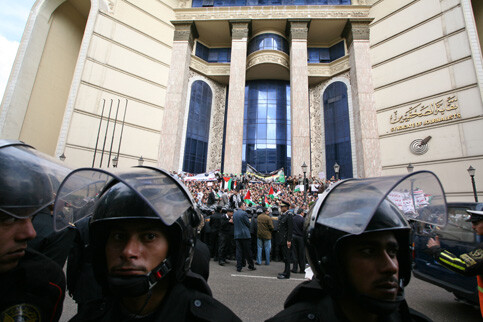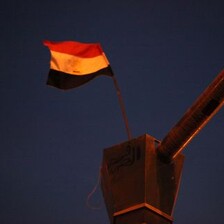The Electronic Intifada 5 January 2009

A demonstration in Cairo against the ongoing Israeli assault on Gaza, 29 December 2008. (Wissam Nassar/MaanImages)
Thousands of Egyptians have taken to the streets to protest the continuing Israeli aggression against Gaza and the participation of the Egyptian regime in the isolation of its population. Last Wednesday, the state responded with a major crackdown in which tens of protestors and journalists were assaulted and arrested.
Around the Arab world, the Egyptian regime has been a target of severe criticism for its continuing role in the ongoing siege of the Gaza Strip and its silence in the face of intense Israeli bombardment of the enclave. Last Tuesday, Egyptian President Hosni Mubarak responded to the criticism by announcing in a televised speech that the Rafah border crossing will remain closed until the Palestinian Authority led by president Mahmoud Abbas regains control of the Gaza strip — a statement that only strengthened the impression that Mubarak approves of the Israeli military action against Hamas, perceived by the regime as a natural ally of the internal islamic opposition in Egypt.
While demonstrations in the region have targeted Egyptian embassies the biggest and most serious challenge against Mubarak’s policy comes within the country. This week has witnessed a major outburst of anger by Egyptians, with hundreds of thousands taking part in demonstrations in cities and towns all over the country. Protestors have been demanding an opening of the Rafah border, the immediate expulsion of the Israeli ambassador, and the cutting of natural gas exports to Israel. While none of these demands are new, they have gained a new urgency with the recent increase in violence war in Gaza.
For opposition activists, criticism of the Egyptian regime’s foreign policy is intimately linked to demands for democratization and social justice in the domestic sphere. “We came here today not only to demand an end to the siege of Gaza, but to demand an end to the regime of the Zionist Muhammad Hosni Mubarak,” a socialist activist said during a demonstration held outside the Press Syndicate in Downtown Cairo on saturday evening. “We all know that the road to the liberation of Palestine is through the liberation of Egypt, which has been occupied by this regime for 28 years!”
While the protests have been peaceful and, until last Tuesday, largely tolerated by the authorities — at least in comparison to the regular practice of using massive force to prevent any large scale public protest — on Wednesday things quickly worsened. Around noon riot police and plainclothes officers laid siege to the central Tahrir (“Liberation”) Square where the opposition political movement, the Socialist Alliance, had called for a demonstration outside the headquarters of the Arab League just as Arab foreign ministers were meeting to discuss the situation in Gaza. When a small group of activists gathered in a corner of the square police immediately intervened, briskly shoving journalists and photographers aside and arresting several protestors. Also arrested was a journalist from the left-leaning newspaper al-Badeel. At the same time police broke up a pro-Gaza demonstration in the northern Sinai town of al-Arish, not far from the Gaza border, also arresting a journalist from the same newspaper.
Shortly after that security forces cleared the street outside the Tagammu Party headquarters where party members where shouting pro-Palestinian chants from the balcony. An hour later, the repression turned to the Cairo University, where students had initiated a sit-in outside the main gate. They were soon surrounded by men in civilian clothes, who forced them inside the gates while hundreds of riot police cordoned off the area — a tactic often used to prevent embarrassing pictures of police beating up students.
The major confrontation of the day, however, took place outside the Lawyers Syndicate, where the Muslim Brotherhood and other opposition groups had called for a huge demonstration in support of Gaza. While the Mubarak regime had tolerated similar protests organized by the Muslim Brotherhood earlier this week — seemingly on the condition that protestors avoid slogans on domestic issues and especially those aimed directly against the Egyptian president Hosni Mubarak — this time was different. According to eyewitnesses, large numbers of protestors were arrested in surrounding streets before even arriving to the demonstration.
As I arrived to the scene thousands of protestors were blocking Ramses street, a main street in downtown Cairo, chanting “We are all Hamas!” and “With our blood and souls, we sacrifice ourselves for you Palestine!”
“We will continue to protest despite these attempts by the police to scare us, because we have to show the world that we do not approve of the politics of our government,” said Mahmoud, a middle-aged Muslim Brotherhood member who took part in the protest. “Egypt is part of an alliance between Washington, Tel Aviv, and Mahmoud Abbas against the Islamic movement of Hamas. Instead of helping the Palestinians, we are supporting the Israelis by selling them gas below market value!”
When plainclothes officers assaulted and arrested several people in the street, dragging them into police pick-ups, several fights erupted between demonstrators and police. Just when it seemed like the security forces might lose control over the situation the demonstration was called off and protestors dispersed peacefully — adding fuel to recent criticism from some leftist and other opposition activists that the leadership of the Muslim Brotherhood is avoiding confrontation and taking a soft stance towards the regime in return for being able to operate freely in the social and economic sphere.
Immediately after noon prayer on Friday several demonstrations organized by the Muslim Brotherhood outside mosques in downtown Cairo was broken up violently by riot police armed with sticks and batons, who arrested tens of protestors. Daily News Egypt journalist Sarah Carr reported one man being beaten into unconsciousness by four plainclothes police as he was removed from a demonstration outside the Shareyya mosque. Ali Zalat, a journalist from local newspaper al-Masry al-Youm was also taken to hospital with head injuries after being attacked, and police confiscated the memory cards of several photographers covering the protests.
Last time similar confrontations took place in downtown Cairo was when police used tear gas to disperse a large demonstration in solidarity with Gaza during the brief opening of the border last January. Thus, 2008 ended in the same way it started. And it’s only appropriate that a year marked by intense labor struggles, including a massive popular uprising against the Mubarak regime in the industrial town of Mahalla in April, should end with a another major outburst of popular anger.
Per Bjorklund is a freelance journalist based in Cairo since 2006, covering social protest movements and dissent in Egypt as well as events in the region.
Related Links



